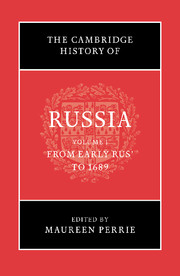Book contents
- Frontmatter
- 1 Introduction
- 2 Russia’s geographical environment
- Part I Early Rus’ and the Rise of Muscovy (c. 900–1462)
- Part II The Expansion, Consolidation and Crisis of Muscovy (1462–1613)
- Part III Russia Under the First Romanovs (1613–1689)
- 19 The central government and its institutions
- 20 Local government and administration
- 21 Muscovy at war and peace
- 22 Non-Russian subjects
- 23 The economy, trade and serfdom
- 24 Law and society
- 25 Urban developments
- 26 Popular revolts
- 27 The Orthodox Church and the schism
- 28 Cultural and intellectual life
- Bibliography
- Index
- Plate section"
- Plate section"
- References
26 - Popular revolts
from Part III - Russia Under the First Romanovs (1613–1689)
Published online by Cambridge University Press: 28 March 2008
- Frontmatter
- 1 Introduction
- 2 Russia’s geographical environment
- Part I Early Rus’ and the Rise of Muscovy (c. 900–1462)
- Part II The Expansion, Consolidation and Crisis of Muscovy (1462–1613)
- Part III Russia Under the First Romanovs (1613–1689)
- 19 The central government and its institutions
- 20 Local government and administration
- 21 Muscovy at war and peace
- 22 Non-Russian subjects
- 23 The economy, trade and serfdom
- 24 Law and society
- 25 Urban developments
- 26 Popular revolts
- 27 The Orthodox Church and the schism
- 28 Cultural and intellectual life
- Bibliography
- Index
- Plate section"
- Plate section"
- References
Summary
The election of Michael Romanov as tsar in 1613 is conventionally seen as marking the end of the Time of Troubles, but social unrest continued for some time. The cossack leader Ivan Zarutskii based himself in Astrakhan’ in 1613–14 with his mistress Marina Mniszech, the widow of the First and Second False Dmitriis, and promoted the claim to the throne of her infant son, ‘Tsarevich’ Ivan Dmitrievich. Zarutskii and the little pretender were executed in the summer of 1614 and, although the cossacks continued to create problems for the government in 1614–15, subsequent protests against the new regime were only sporadic. The conclusion of peace with Sweden in 1617 and with Poland in 1618 brought an end to foreign intervention, and the next decade and a half was a period of relative stability for Russia, both internally and externally.
In 1632 Tsar Michael’s government took advantage of the interregnum in Poland-Lithuania which followed the death of King Sigismund III. An army led by the boyar M. B. Shein was dispatched to the western frontier in a bid to regain Smolensk, which had been ceded to the Poles in the Treaty of Deulino of 1618. Thereafter Russia was to be involved almost continuously in warfare (see Chapter 21); the economic and social strains created by these wars contributed in large part to the series of popular revolts which caused the period to be described as ‘the rebellious century’. The principal urban uprisings occurred in Moscow and other towns in 1648–50, and in the capital in 1662 and 1682; the most extensive revolt was the great cossack–peasant uprising led by Sten’ka Razin, in 1670–1.
- Type
- Chapter
- Information
- The Cambridge History of Russia , pp. 600 - 617Publisher: Cambridge University PressPrint publication year: 2006

